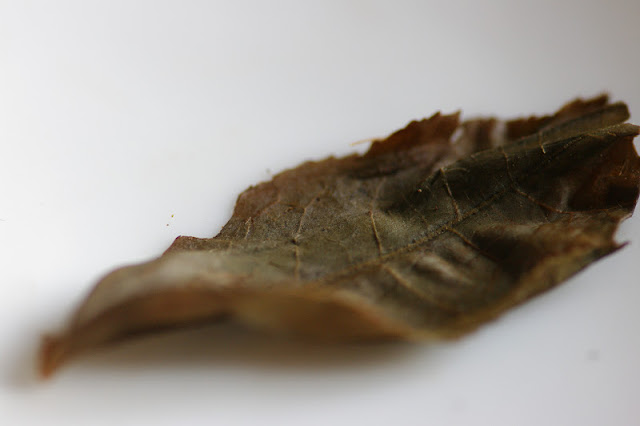The first of "big" Cheng Guang He Tangs arrives. The sample of CGHT's 99 Dragon and horse & 2001 Mansa is still available from Houde (it's hidden - you won't find it in sample section, it's to be found in CGHT part of the shop). I thought that the price was still rather reasonable and gave it a go.
The wet leaves give an interesting, complex aroma of Yiwu wood - woody taste/aroma is not that common in Yiwu I think, but the honey&nuts Yiwu sometimes lose their soul and become more woody when, e.g., stored in too dry environment. The aroma is not only woody though, there are pleasant overtones known from higher-class alcoholic drinks (brandy, whiskey).
The tea starts quite fishy, but two rinses instead of one fix that quite well. It is a small deficiency, nothing groundbreaking.
The main taste is amber in feeling as in color. Considering this is a Yiwu tea, there is a lot of wood - not a bad wood though. And some hemp too. It gradually becomes more nutty with further brews. The main body of the taste - the wood/nuts is rather good, but a) Feels somewhat hollow - one is used to fuller performance from Yiwu, b) Goes away too fast - the taste is not really persistent in mouth.
If one deals with the not-that-awesome main taste, he may found that there is a lot of subtle complexities in the tea. Occasional very original and pleasant tastes (oak keg taste, dried plums - these appear rather often,...) jump out of the cup and then disappear again. It was a lot of fun to concentrate on these small tastes which lend a greater overall complexity to the tea.
Drinking this tea felt like riding a train through vast savannas - although the sight of grass, occasional trees and small hills is pleasant, it is not really that fun thing to do for too long. But sometimes, you catch, for a moment, a sight of a lion hunting a zebra - or a group of tribal people going somewhere, etc., which makes the experience worthwhile.
The tea is not especially strong in the way of aftertaste sadly. Also, it does not feel that intense at the beginning - this gets better with further brews though.
The first photo is of a rather normal Yiwu leaf.
The second leaf is very different, being small and with very small serration - it's like if it was a different varietal (similar to what grows in Jingmai). Can someone shed more light on this? I thought that Yiwu leaves were generally like on the first image.
Due to the "enjoyable bits" in taste, this tea was an enjoyable colleague for several afternoons (Do you too have the odd tendency to convert Heroes 3 words - few, several, lots, throng,... - to numbers right away?). It is not great though, I'm afraid, missing too much in the way of main taste - that is actually what most people will be interested in. It's like if the tea was already a bit tired.
Maybe it just is not that a great blend, leading to the tiredness.
I have been experimenting a lot with blending tea recently - not maocha, true, but still, even mixing pressed cakes gives one an idea - and found many difficulties. There are some natural conclusions coming from the experience, but I did not realize these before the actual attempts at blending. The interesting part is that most of the blends end in the Xizihao style - the feeling is often good, but the taste is not (there is even the similarity to the Xizihaos "nothingness" of taste - the only result I'm able to achieve with considerable consistency) - I do have an explanation ready and may write about it sometime.
The point is - blending is a terribly hard thing to do - to make a drinkable blend is difficult - and to make a "after10yearsdrinkable" blend is probably difficult^2 (difficult>1, of course).
Further reading: Half-Dipper







Žádné komentáře:
Okomentovat